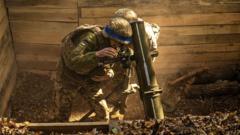Ukrainian Soldiers Struggle in Challenging Kursk Campaign
Nearly four months after launching an offensive into Russia’s Kursk region, Ukrainian soldiers are facing increasingly difficult conditions and growing pessimism about their mission. Through confidential Telegram messages, soldiers paint a bleak picture of their current situation, describing constant challenges and diminishing hope.
The soldiers report dire circumstances, including severe weather, chronic sleep deprivation, and constant Russian bombardment using massive 3,000kg glide bombs. Russian forces are gradually retaking territory, with soldiers like Pavlo believing this trend will continue. The troops are experiencing immense fatigue, with units comprised largely of middle-aged men being moved directly from other fronts with minimal rest.
The soldiers’ motivation appears low, with many questioning the operation’s initial objectives. Some believe their primary goal is now to hold the seized territory until the potential change in US leadership in January, hoping for future negotiations. As one soldier, Pavlo, stated, they aim to hold maximum territory “in order to exchange it for something later.”
Despite support from Western allies like the US, UK, and France, which have permitted long-range weapon use against Russian targets, morale remains low. The soldiers feel disconnected from these strategic efforts, with one noting, “No-one sits in a cold trench and prays for missiles.”
The strategic importance of the Kursk campaign remains debated. While some soldiers believe it has diverted Russian forces from other regions, others feel they should be fighting on Ukraine’s eastern front instead. The operation has already seen Ukraine lose approximately 40% of the territory initially seized in August.
Military analysts suggest the campaign still serves a crucial purpose. Serhiy Kuzan from the Ukrainian Security and Cooperation Centre argues that the operation forces Russia to devote significant resources to this front, potentially weakening their efforts elsewhere.
Rumors of North Korean troops supporting Russian forces have circulated, but the soldiers contacted have not encountered them. They’ve even been instructed to capture a North Korean prisoner, with promises of rewards like drones or extra leave.
The Kursk operation draws parallels to previous challenging Ukrainian military efforts, such as the costly Krynky bridgehead operation, which some viewed as more of a media spectacle than a meaningful military action.
Senior commanders in Kyiv remain supportive, claiming the operation annoys Putin and causes heavy Russian losses. Their commitment is pragmatic: they will continue the operation “as long as it is feasible from the military point of view.”
The soldiers’ messages reflect a mix of exhaustion, uncertainty, and a sense of being caught in a complex geopolitical struggle with unclear outcomes. Their primary focus remains survival and supporting each other through increasingly challenging circumstances.



